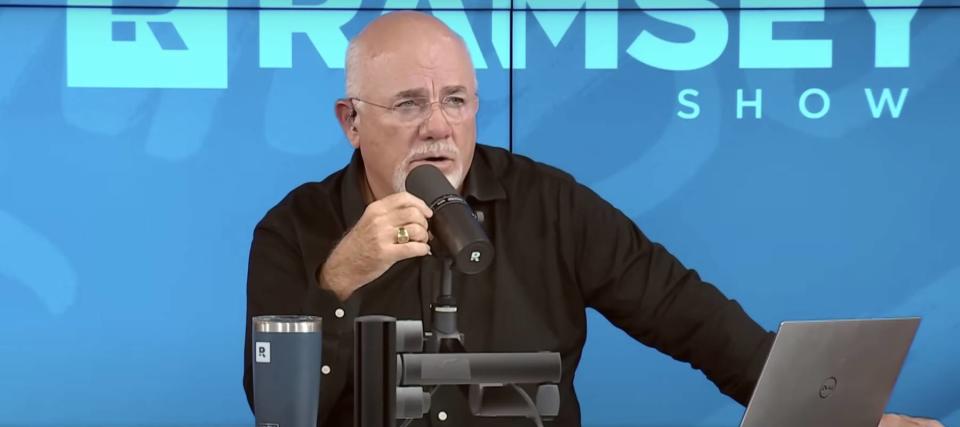'That was your plan, to move into the house broke': This Charlotte woman just bought a $330K house — but now has very little money for furniture and a fridge. Here's what Dave Ramsey told her

Homeownership is a big part of the American Dream, but lately the housing market has been a source of nightmares. According to an April survey by Clever Real Estate, 93% of Americans who purchased a home in 2022 or 2023 had regrets about their decision, and 58% said they overpaid.
Financial guru Dave Ramsey spoke to a concerned buyer in a recent episode of “The Ramsey Show.”“That was your plan, to move into the house broke,” he told her after hearing her dilemma.
Don’t miss
Commercial real estate has outperformed the S&P 500 over 25 years. Here's how to diversify your portfolio without the headache of being a landlord
Save big on your holiday shopping with an app that’s already saved users $800 million
Find out how to save up to $820 annually on car insurance and get the best rates possible
The caller, Amy from Charlotte, North Carolina, was set to close on a home worth $330,000. She said she made a $60,000 down payment to seal the deal and was wondering how to finance the furnishing of her new home without going into debt. She said she doesn't even own a bed or refrigerator.
She added that she has roughly $20,000 in emergency savings, but Ramsey and his co-host did not want her to spend it all on furniture. “You close on a $330,000 house. You spend your last $20,000 furnishing it. The next day something is going to go wrong and you have no money,” said Ramsey.
A sobering 27% of homebuyers said their financial situation deteriorated after closing the deal, according to the Clever Real Estate survey.
Ramsey gave her a simple plan to furnish the house without borrowing money.
Start with the basics
Ramsey’s first piece of advice was to buy the basics: a mattress, a bed and a used fridge. He recommended a budget of $5,000 for these essential items. “That’s going to leave $15,000 in your emergency fund,” he said. “That way, if you have an emergency, you don’t lose your home.”
To be fair, $15,000 is a sizable cash buffer for emergencies. JPMorgan Chase’s analysis of customer checking and savings accounts found that households in the top quartile of income had median balances around $9,000. Meanwhile, 63% of American workers would struggle to handle a $500 emergency, according to a SecureSave survey reported on by CNBC.
Simply put, Amy would be in a better position than most Americans even if she spent $5,000 on the basics. Ramsey, however, would have preferred a wider cash buffer. “You took it all the way to the edge, kiddo,” he told Amy. “You left no margin in this deal.”
Read more: Thanks to Jeff Bezos, you can now use $100 to cash in on prime real estate — without the headache of being a landlord. Here's how
Accumulate over time
Amy said she earns roughly $5,000 a month through a combination of regular income and military veteran disability payments. Ramsey told her to gradually buy all the other items for her house with a portion of this income. “You’re going to cash flow furnishing this place out of your income,” he recommended.
Steadily purchasing a few items every month should allow Amy to manage her cash flow efficiently. A few hundred dollars on a used dining table or refurbished vacuum cleaner shouldn’t break the bank. “Go to the rich end of town and go to the garage sale,” suggested Ramsey. “You can buy a $9,000 leather couch for $500 … because the [rich] lady redecorated and didn’t like the color [of the couch] anymore.”
Don’t depend on someone you’re not married to
Amy said the plan is for her boyfriend to pay part of the mortgage when they move into her new house, but Ramsey recommended they keep their finances separate. "I don't recommend that you ever buy a house or depend on someone that you're not married to to pay for your house," he said.
Although Amy said she would own the house, it's worth noting that Ramsey has never been a fan of co-ownership, unless it’s between a married couple. The reality is that the high cost of homeownership has pushed more people to consider co-buying. Fifty-three million Americans currently live in properties they co-own with someone they are not married to, according to CoBuy, a platform that helps facilitate such transactions. It estimates that such co-buyers will account for 26.7% of all U.S. home purchases in 2023.
These arrangements can be cumbersome to deal with if the friendship or relationship falls apart.
What to read next
Owning real estate for passive income is one of the biggest myths in investing — but here's how you can actually make it work
Millions of Americans are in massive debt in the face of rising rates. Here's how to get your head above water ASAP
Finish 2023 stronger than you started: 5 money moves you should make before the end of the year
This article provides information only and should not be construed as advice. It is provided without warranty of any kind.

 Yahoo Finance
Yahoo Finance 